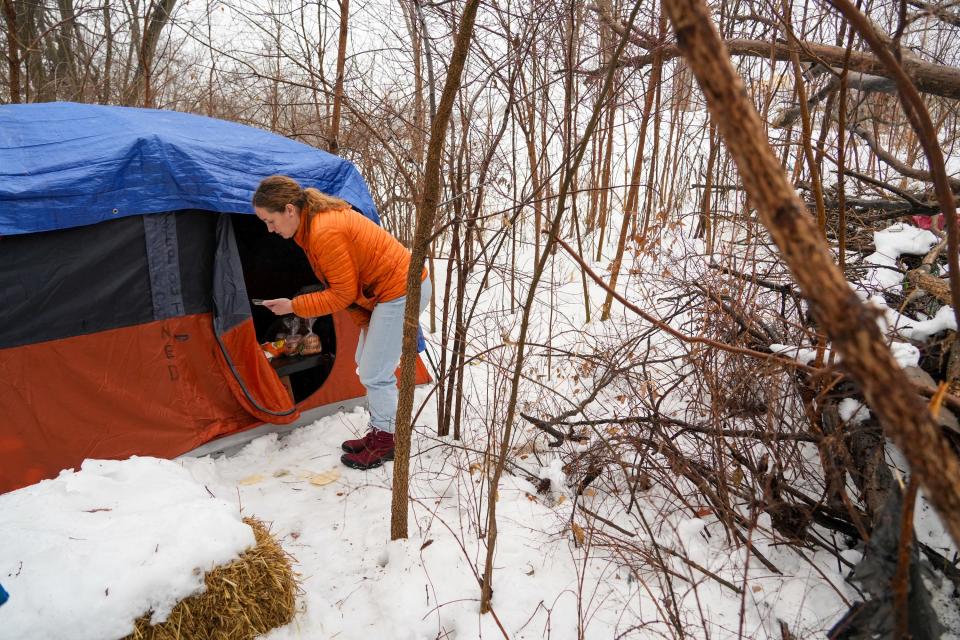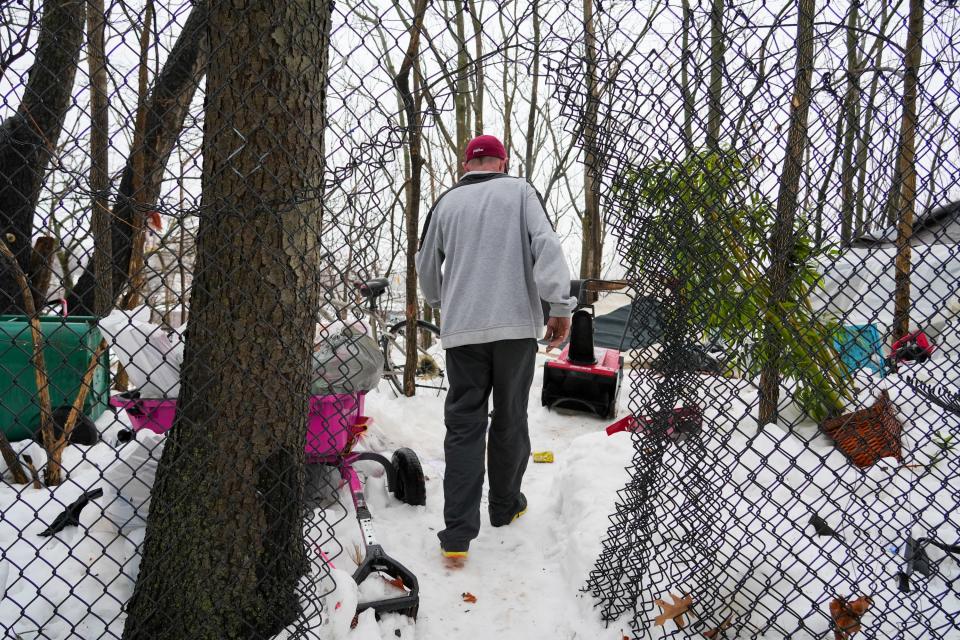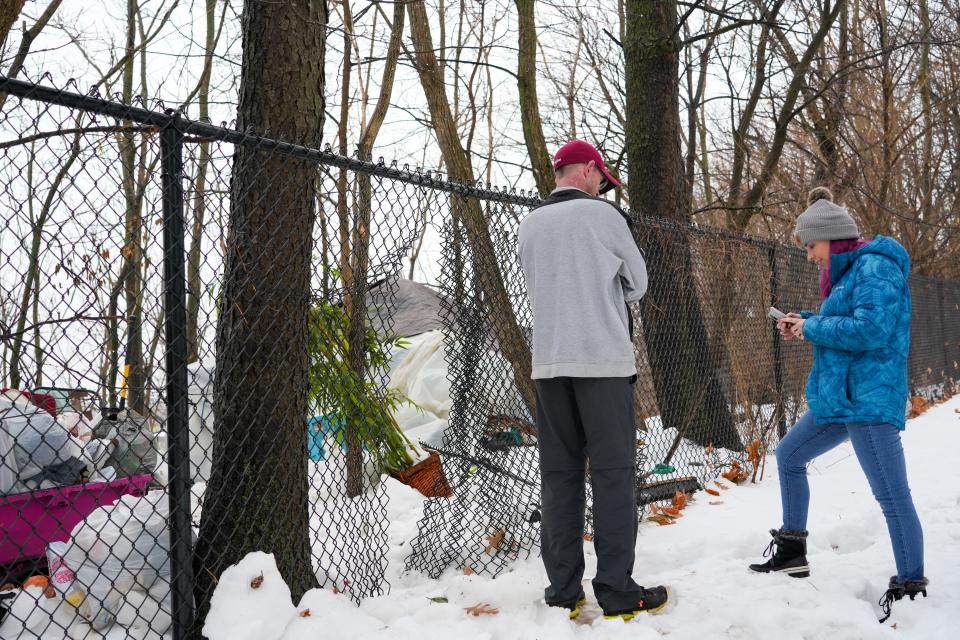We tagged along on a biannual count of Polk County's homeless people. Here's what we saw:
Part of an occasional series.
Katie Nelson knelt by the foot of a small tent tucked behind bare tall trees on a snow-covered field on the south side of Des Moines. Spotted nearby were a silver Christmas tree with strands of green ribbon and piles of children's strollers. A turquoise doormat stuck out from the frosty, muddy ground.
Nelson, bundled up in a winter jacket with matching bright yellow rain boots, was met with soft voices that emerged from the tent's opening. The burning embers from a cigarette glowed inside.
Nelson, a homeless care manager at Primary Health Care (PHC), introduced herself once more to the three women huddled together and told them about a brief survey she and her other teammates were conducting. The women agreed to participate, and Nelson pulled out her cellphone from her pocket and pulled up the list of questions. She told them it would take only a few minutes and that they could provide as much — or as little — information as they wanted.

At the end, she said, they would each receive a $5 gift card to QuikTrip and care packages, which included snacks, water bottles and socks.
Thursday morning marked the final hours of the January point-in-time count, and Nelson was among a group of PHC staff and local volunteers recording the number of people experiencing homelessness on a single night. This year's count was conducted during four four-hour shifts over a 24-hour period that began at noon Wednesday and ended at noon Thursday.
More: As Des Moines' homeless population grows, the city grapples with solutions
What is the point-in-time count?
Required by the U.S. Department of Housing and Urban Development, the point-in-time count — or PIT for short — is held every January and July and serves as a snapshot of homeless people's experiences, living situations and resources available in communities.
Last year's January PIT count found approximately 644 homeless people in Polk County — a slight jump from the 606 recorded in 2022 and the 576 documented in 2021. Leaders said at the time that data showed the number of people experiencing homelessness was steadily rising to pre-pandemic levels.
Other agencies such as Polk County's homelessness planning organization, Homeward, partner with PHC to conduct the count, which Nelson says also helps her and other housing leaders build stronger relationships with people they meet along the way.
On Thursday morning, Nelson hopped into an SUV with her colleague Josh Wittenberg and first-time volunteer Elijah Williams and traveled to the homeless encampments on the city's south and east sides. PHC housing navigator Amanda Murphy joined Des Moines’ homeless policy administrator Amber Lewis in another vehicle and headed for the north side.
Murphy told the Des Moines Register, who was invited to follow teams on the PIT count, that a former co-worker once likened it to an “adult hide-and-seek.”
“And it really is,” she says, “because the places you think you're going to find something, you find nothing. Then, you find people in places (that you don’t expect)."

To identify camping sites, PIT count volunteers typically rely on people from local agencies, like Wittenberg, who, as PHC's street outreach coordinator, connects with people experiencing homelessness weekly. But that does not always make the job easier. The search for individuals can be meticulous, fluid — and often, a shot in the dark.
Both teams on Thursday trudged through snow, walked on wet, uneven trails and weaved through lines of trees in the hopes of speaking to unsheltered people and learning more about their lives. More often than not, the survey paved the way for conversation between those individuals and volunteers and staff.
It all comes back to building trust and rapport, Nelson and Wittenberg explained.
"I'm not just here for that quick survey, but in the future (if) they need services," Nelson says, "they can recognize us and be like: 'Hey, I've spoken to that person before, and they were cool. They didn't push me to do anything. I know they're a safe person.'"
More: More people in Polk County are homeless, and for longer periods, data shows
There are limitations to the PIT count, Murphy told the Register. It's not exhaustive, she says, "like it's never going to catch everybody. It's just sort of like one picture of who you happen to be able to find that day."
Lewis, who serves as a liaison between city officials, shelters and service organizations, added that the uncertainty coupled with limited outreach resources can be a source of frustration with the count.
“I just have this burning desire to find everybody,” Lewis said, noting she knows that there are uncounted people who aren't able to connect with volunteers within the 24-hour period.
Leaders say housing projects in the works are a start to combating homelessness
As housing leaders anticipate the results of the latest count — expected to be released in the next couple of weeks — they say longstanding issues loom in Polk County and continue to impact people in need.
A lack of affordable housing units and emergency shelters in the county, including in the Des Moines metro, still poses a challenge for individuals facing homelessness, they said.
At PHC, which is considered the main referral source for the county's housing resources, Nelson and Wittenberg said they have seen more middle-age people and families in need of support and assistance over the last 18 months. They, along with Homeward Executive Director Angie Arthur, said some projects on the horizon could help alleviate the issue, such as:
Longtime nonprofit Anawim Housing broke ground last fall to begin renovating a former Days Inn hotel at 4845 Merle Hay Road into the Monarch — a 40-unit apartment building that offers permanent supportive housing. The new apartments also will include 24-hour on-site supportive services for residents.
The city of Urbandale also plans to convert Motel Relax, 7625 Hickman Road, into a 60- or 61-unit apartment building. At least 18 units will be reserved for low-income individuals or families.
And plans for the county's first sobering center are still underway, which is expected to help people struggling with addiction.
More: It's not just low incomes and housing shortages: Here's what causes homelessness in Polk County
"All those things are important and needed, and it's a great beginning," said Arthur, adding she is awaiting the results of the PIT count and a report analyzing the gaps in the county's homeless agencies to further identify what resources are needed.
On the ground, the teams listened to stories of campers' situations and answered questions about where to find resources, including cellphones and legal advice. The need for transportation to services, lack of beds in emergency shelters and the city's action to clear out encampments last fall were on the list of common concerns.
Nelson, who mainly connects veterans to various programs, said getting any form of identification can be a "headache" for her clients. IDs are needed to apply for jobs or benefits such as Social Security, access shelters, set up appointments with medical providers or retrieve other crucial personal documents.
"The most important document is your ID" and without it, some services become harder to qualify for, she said.

'It's scary' being outside, says an individual who is homeless
On the southeast side of the city, Nelson, Wittenberg and Williams followed a wide trail marked by propane tanks and scraps and stumbled on two men.
One of them was Ryan McQuerry, whose home was made of tarp, metal and wood planks and sat just feet off the trail. McQuerry said he was released from prison nearly a year ago but has been battling homelessness for nearly seven years.
To combat the recent bitter cold, McQuerry said he hunkered down in his home, underneath layers and layers of blankets.
"I knew basically I was playing Russian roulette" in the dangerous low temperatures, he said. "It was like, 'Well, if you don't have something, you don't have something.'"
Over on the north side, Murphy and Lewis made their way through a blanket of snow in a deserted area north of University Avenue, hoping to find individuals who had yet to connect with PIT count surveyors the day before.
About a quarter mile from their car, boots crunching in the shin-deep snow, the volunteers spotted a line of tents. Lewis called out: “Hello? We're from Primary Health Care. Is anybody home?”
More: A guide to shelter, housing resources for people facing homelessness in Polk County
Several seconds passed before a man responded from a dark gray-green tent surrounded by black garbage bags, propane tanks, plastic bins, a mattress, and a shopping cart. One of the man’s neighbors peered out of his tent nearby but told the volunteers he did not speak English.
Murphy and Lewis visited half a dozen locations throughout central Des Moines during the four-hour shift, including the Des Moines Public Library, where some people gather to get referrals to housing programs or employment assistance — or simply seek shelter from the extreme weather.
In spots where they found campers, Murphy and Lewis listened to a man tell them a tree recently fell only a few feet away. At the library, a woman named Christal Derry said she became homeless about four years ago after a falling-out with family.
Derry told the Register "it's scary" being outside.
"I'm from Montana, so I know a lot about survival," she said. "A lot of people really don't, and I taught a lot of people. … What I give, (I) give from my heart if I have it."
Editor's note: This story has been updated to correct the spelling of QuikTrip.
Virginia Barreda is the Des Moines city government reporter for the Register. She can be reached at vbarreda@dmreg.com. Follow her on Twitter at @vbarreda2.
F. Amanda Tugade covers social justice issues for the Des Moines Register. Email her at ftugade@dmreg.com or follow her on Twitter @writefelissa.
This article originally appeared on Des Moines Register: Polk County's count of homeless people: Amid cold, snow, what we saw:

